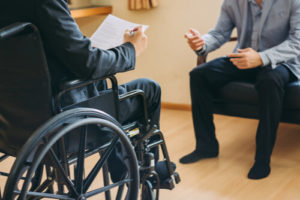Can I Get Disability Benefits After a Car Accident?

If you are in a car accident, you may be able to pursue a personal injury claim. You may be eligible to receive Social Security Disability (SSD) benefits, too.
The Social Security Administration (SSA) provides benefits to people with qualifying disabilities. The many serious injuries that people suffer in car accidents commonly qualify.
To learn more about seeking personal injury damages and SSD benefits after a car accident in North Carolina, contact Hardison & Cochran today. You can speak with a lawyer and receive a free case review. We will make sure you understand all of your rights and options.
How Do Car Accident Injuries Qualify for SSD Benefits?
Regardless of you how are injured, you may qualify for SSD benefits. The main question is: Do you meet the SSA’s definition of “disability?” The SSA considers you to be disabled if:
- You have a severe mental or physical impairment that has lasted or is expected to last at least 12 months, and
- You are not involved in any substantial gainful activity that pays more than a defined limit ($15,120 per year in 2013)
- You cannot perform work you did in the past, and
- You cannot do or be trained to do any other less demanding work.
For more information, please see our page on When is a Person Considered Disabled by Social Security Disability?
Musculoskeletal System Disorders, Other Common Disabilities from Car Crashes
Keep in mind: Several specific types of impairment can qualify you for SSD benefits.
The most common are musculoskeletal system disorders. These disabilities involve damage to muscles, bones, tendons and ligaments. They are common in car accidents. Examples include:
- Fractures (broken bones)
- Amputation of limbs
- Severe burns
- Spine / spinal cord (back) injuries
- Joint injuries.
If you can’t move or perform motor skill movements on a sustained basis after a car accident, you may have a qualifying musculoskeletal disorder.
You may also qualify for SSD benefits if you suffer from other impairments listed by the SSA, including:
- Neurological disorders
- Sensory impairment (vision and hearing)
- Speech impairment (a common side effect of severe traumatic brain injury)
If your injury is not specifically listed by the SSA, you may qualify for SSD benefits if you can establish that your injury is “medically equivalent” to one listed by the SSA.
Regardless of the type of condition you suffer from, you will need to provide the SSA with medical evidence. If this evidence or information in your application is incomplete or unclear, your application for SSD benefits could be denied.
At Hardison & Cochran, we will make sure your application for SSD benefits is complete and can be properly understood by those deciding your claim. If there is a problem, we will represent you in appeals and pursue a fair result for you.
Our North Carolina SSD Benefits Attorneys Help Car Accident Victims
Contact Hardison & Cochran today for a free consultation about your disability from a car accident. We will aggressively seek the SSD benefits you deserve.
For More Information:
- SSD Listing of Impairments – Adult Listings (Part A) , Social Security Administration


